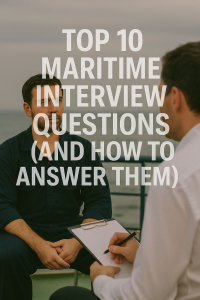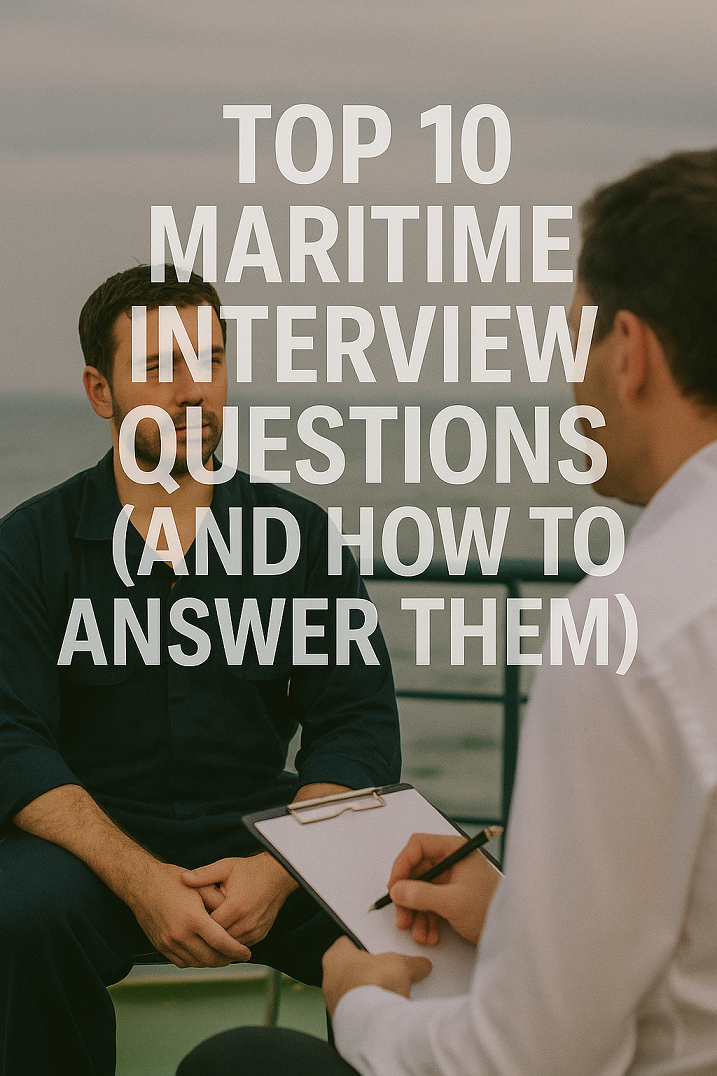Discover the top 10 maritime interview questions and expert answers that help you stand out. Learn how to handle competency, technical, and situational questions with confidence.
Why Maritime Interviews Matter in Modern Seafaring Careers
 Whether you’re applying for your first cadetship or advancing to a senior rank, maritime interviews are a crucial step in building a successful career at sea. Shipping companies today look for seafarers who possess not just technical knowledge, but also strong communication skills, situational awareness, and a commitment to safety and compliance.
Whether you’re applying for your first cadetship or advancing to a senior rank, maritime interviews are a crucial step in building a successful career at sea. Shipping companies today look for seafarers who possess not just technical knowledge, but also strong communication skills, situational awareness, and a commitment to safety and compliance.
In recent years, changes in industry practices, remote assessments, and tighter compliance requirements—such as STCW updates and IMO’s safety management code—have reshaped interview expectations. According to a 2023 report by the International Chamber of Shipping (ICS), over 68% of maritime employers now include behavioral and scenario-based questions alongside traditional competency checks.
This guide breaks down the top 10 maritime interview questions—along with expert tips on how to answer them.
1. Tell us about yourself and your maritime background.
Why it’s asked:
This is your first impression. Employers want to assess your communication style, passion for the profession, and relevance to the role.
How to answer:
Structure your response with a brief background, training, and recent experience. End with what you’re looking for next.
Sample: “I’m a marine engineering cadet with hands-on experience on a tanker vessel during my last training phase. I’ve completed my STCW courses, and I’m now eager to work in a company that values safety and mentorship.”
2. What are your responsibilities during watchkeeping?
Why it’s asked:
To assess your familiarity with real-time operations, safety protocols, and regulatory requirements.
How to answer:
Refer to STCW Code A-VIII/2 and include practical duties: log entries, safety rounds, monitoring alarms, and communicating with the bridge.
Pro Tip: Frame your answer around safety, accuracy, and alertness.
3. How do you handle emergency situations onboard?
Why it’s asked:
Interviewers want to know how you think under pressure and whether you follow procedures.
How to answer:
Use the STAR technique (Situation, Task, Action, Result). Discuss a drill or real situation.
Sample: “During a fire drill in the engine room, I acted as the boundary man. I stayed calm, followed the emergency checklist, and reported conditions via handheld radio.”
4. Can you explain the working principle of a purifier?
Why it’s asked:
A common technical question, especially for marine engineers.
How to answer:
Break it into simple steps: centrifugal separation, bowl rotation, sludge ejection. Mention its purpose—to remove water and solids from fuel/lube oil.
Include: Any experience operating Alfa Laval or Mitsubishi systems.
5. How do you ensure safe bunkering operations?
Why it’s asked:
Bunkering involves high risks—spills, fires, and pollution.
How to answer:
List safety checks: scupper plugs, drip trays, SOPEP readiness, UHF communication, and closed-system sampling. Emphasize MARPOL Annex I compliance.
6. What is the role of ISM Code onboard?
Why it’s asked:
To test knowledge of safety systems and regulatory compliance.
How to answer:
Summarize the ISM Code’s purpose: promote safe ship operation, prevent human injury or loss of life, and avoid environmental damage.
Mention: Safety Management System (SMS), drills, audits, and DPA reporting.
7. Describe a conflict you had onboard and how you resolved it.
Why it’s asked:
Crew compatibility is essential for long voyages.
How to answer:
Explain the situation neutrally, focus on listening and professional resolution. Avoid blaming.
Example: “A senior misunderstood a task I was assigned. I clarified it respectfully and suggested confirming orders with the officer next time.”
8. What are the types of fire extinguishers onboard and their uses?
Why it’s asked:
To evaluate your emergency response readiness.
How to answer:
List: CO2 (electrical), foam (fuel oil), dry powder (chemical), and water (general fire). Connect extinguisher type to SOLAS Chapter II-2 requirements.
9. How do you contribute to energy efficiency onboard?
Why it’s asked:
To align with IMO’s Energy Efficiency Existing Ship Index (EEXI) and SEEMP initiatives.
How to answer:
Mention actions like timely defrosting of refrigeration systems, minimizing fuel loss, reducing engine load, or reporting machinery anomalies.
Bonus: Reference MARPOL Annex VI and company-specific SEEMP.
10. Why do you want to join our company?
Why it’s asked:
To evaluate your research, motivation, and alignment with the employer.
How to answer:
Mention the company’s safety record, training programs, or vessel types that match your goals. Be sincere.
Avoid: Generic answers like “It’s a reputed company.”
FAQ: Maritime Interviews
Q1: Should I memorize answers?
No—understand the concepts. Use your own experiences to answer naturally.
Q2: How should I dress for an online maritime interview?
Dress in formal attire, ensure proper lighting, and test your mic and connection beforehand.
Q3: Will I be asked about STCW, MARPOL, or SOLAS?
Yes. Expect regulatory questions. Revise recent amendments and real-life applications.
Q4: What if I don’t know the answer to a technical question?
Be honest. Say, “I don’t know at the moment, but I’d like to learn.” Avoid guessing.
Q5: How important are soft skills in maritime roles?
Very. Companies value teamwork, leadership, and decision-making as much as technical skills.
Conclusion
Maritime interviews are more than a test of knowledge—they assess mindset, behavior, and readiness for life at sea. By preparing for these top 10 questions, understanding the rationale behind them, and reflecting on your own experience, you can enter the interview room with confidence and competence.
Call to Action: Download our Free Maritime Interview Prep Checklist and get ready to set sail on your dream job.
References
- International Maritime Organization. (2023). STCW Convention and Code. https://www.imo.org
- ICS. (2023). Maritime HR and Recruitment Trends. https://www.ics-shipping.org
- The Nautical Institute. (2022). Competency and Communication at Sea. https://www.nautinst.org
- DNV. (2022). Maritime Training and Behavioral Assessments. https://www.dnv.com

